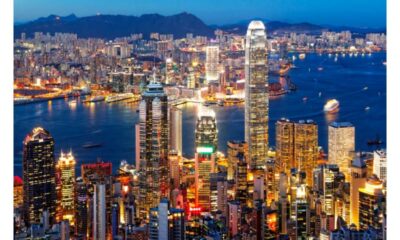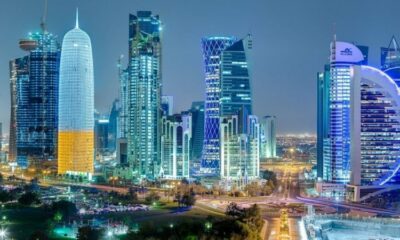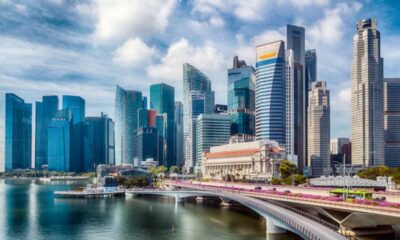Business
Hong Kong has a Fantastic Opportunity to Spearhead Asia’s Net-zero Economy Through Green Finance

China is without a doubt at the forefront of green technology and green energy advancements. The rate at which solar installations are expanding would result in an 85% increase in global capacity by 2025. More solar panels are currently installed in large-scale projects in China than in the entire globe. While BYD has overtaken Tesla as the leading EV manufacturer, China has taken the world by storm as the country producing the most EVs. According to the International Energy Agency, 45% of all cars in China are electric on the road, compared to 25% in Europe and around 11% in the US.
Riding this momentum, Hong Kong presents a significant opportunity to support the advancement of the region’s net-zero goals as China’s global technology hub and a bridge to the rest of Asia. Asia can realize a fast transformation of energy and other key sectors to positively impact the global climate change issue by cooperating with China and following its lead.
Poman Lo, founder of the Institute of Sustainability and Technology (IST) and organizer of the first One Earth Summit, which took place in Hong Kong in late March, issued a rallying cry, saying that Asia is in a perfect position and must take on the challenge of spearheading the global shift toward net-zero emissions.
She and other industry leaders agreed with Hong Kong Chief Executive Lee Ka Chiu, who stated that the city is the perfect location for forming alliances to advance creative solutions that advance sustainability because of its long-standing financial strengths and its rapidly burgeoning reputation as a hub for innovation and technology.
The first-ever One Earth Summit, organized by IST and held in Hong Kong, was a first-of-its-kind partnership between the government and non-governmental organizations, with a clear focus on action and the impact of climate change. Global sustainability leaders supported the event, including Claus Schwab, the founder of the World Economic Forum, global investment giants Ray Dalio, Jim Coulter of TPG Capital, and Prince Max of Lichenstein, as well as renowned climate scientist Johan Rockstrom and many others. The Giving to Amplify Earth Action (GAEA) group of the World Economic Forum served as co-organizer.
Firsts from Hong Kong: green bonds and more
The government’s recent actions have accelerated the commitment to excel in the field of green finance. Innovations like the first tokenized green bond in history are pioneered by Hong Kong. The retail green bond’s entire issuance amount has already surpassed its initial goal by a significant margin, reaching HK$20 billion. In addition, the government recently announced plans to raise the annual issuance of green bonds to HK$65 billion, along with the announcement of an additional batch of digital green bonds totaling HK$6 billion. Projects about sustainable finance will also be included in the program’s expanded scope.
Hong Kong’s goal to be one of the first countries in the world to align sustainability disclosures with benchmarks released by the International Sustainability Standards Board (ISSB) is another action that sets the standard for the market.
Christopher Hui, Hong Kong’s Secretary for Financial Services and the Treasury announced a vision statement announcing the launch of a roadmap by 2024 to give businesses in Hong Kong a clear, transparent route for sustainability reporting.
Strengthening the groundwork for a green taxonomy benefits the rapidly developing green finance ecosystem in the city. An industry-wide recognized taxonomy will go some way towards establishing clearer reporting standards, but Hong Kong already has many essential components in place: a government green bond framework, a mandatory ESG disclosure requirement, a government debt issuance program, and a green and sustainable finance grant scheme.
Ecosystem strength with progress at multiple levels
One of the other significant innovations is the physical risk assessment online platform developed by the Hong Kong Monetary Authority (HKMA) to serve all local authorized institutions that fall under the regulator’s purview. This platform will be available to all banks in Hong Kong for use in analyzing their current portfolio of physical risks related to climate change. Being the first regulator in the world to launch an initiative of this kind, HKMA demonstrates the proactivity of the city in green and sustainable finance and gives a positive signal about Hong Kong’s capacity to manage climate risk.
A Hong Kong Green Fintech Map is an initiative by Financial Services, the Treasury Bureau, the Securities and Futures Commission, InvestHK, and Cyberport that aims to assist private companies in finding Green FinTech solutions that meet their needs. Currently, in its soft launch phase, this groundbreaking project in Hong Kong, the directory and business matching platform, will foster the robust expansion of the city’s FinTech ecosystem.
Additionally, this momentum transcends governmental organizations. Decentralized physical infrastructure network (DePIN) ecosystem development is being driven by companies such as Arkreen Network and Hashkey Group, whose goal is to enable transactions in Renewable Energy Certificates.
Arkreen envisions Hong Kong as the global center of this cutting-edge ecosystem. Its goal is to standardize data-driven, on-chain tokenization and offset as the Web3 community’s accepted method of achieving carbon neutrality, thereby promoting an inclusive global climate action network.
The strength of Hong Kong: Mainland China’s center for offshore finance and risk management
To facilitate the shift to a low-carbon economy, Hong Kong must close its enormous gap in green financing, which means that the city has a huge global role to play as Mainland China’s offshore capital hub for green finance.
According to Joseph Chan, Undersecretary for Financial Services and the Treasury, “Asia’s green transformation will require around US$66 trillion in investment over the next 30 years, highlighting the huge demand for green financing in the region.” He also mentioned Hong Kong’s rise at the Redefining Hong Kong conference in November of last year, pointing out that the city is responsible for one-third of Asia’s green and sustainable debt, which includes both bonds and loans.
According to recent government statistics, the city is one of the largest green finance hubs in the world, home to about 220 ESG funds with $170 billion in assets under management. Hong Kong maintains its status as China’s offshore capital hub for green finance by drawing investments from investors all over the world. For example, consider the announcement from the Australian family office Twynam Group that they intend to raise US$50 million to invest in tech companies that reduce carbon emissions in Hong Kong and the Greater Bay Area (GBA).
When you combine this capital inflow with Hong Kong’s rapidly developing green technology sector, the potential for real impact is astounding. More than 4,200 start-ups have already established themselves in the city, and venture capital and private equity investors in Hong Kong, who together oversee approximately US$220 billion in assets, are showing a growing interest in funding green projects.
“Hong Kong’s highly efficient financing platform and technological strengths are becoming the driving forces of green transformation for the city, the country, and the Asian region,” the honorable financial secretary stated in a previous blog post on the subject of sustainability. We have a fantastic opportunity to better utilize Hong Kong’s position as a global hub for climate change by bringing together leaders from the public and private sectors with entrepreneurs to foster cross-sectoral interaction and collaboration between green tech and green finance.
-

 Business3 weeks ago
Business3 weeks agoPrakash and Kamal Hinduja: Driving Social and Environmental Change
-
Education4 weeks ago
Fred DuVal: University Leadership as a Critical Resource for Climate Change Research and Life-Saving Solutions
-

 Cryptocurrency3 weeks ago
Cryptocurrency3 weeks agoDesigned For The Masses: How Akasha (AK1111) Is Unlocking Crypto For The Next Billion Users
-

 Health3 weeks ago
Health3 weeks agoThe Hinduja Brothers Commitment to Global Health: Empowering Communities Across Borders
-

 Cryptocurrency4 weeks ago
Cryptocurrency4 weeks agoNexaglobal & Future World Token (FWT): Could This Be the Next Big Crypto Investment of 2025?
-

 Startup2 weeks ago
Startup2 weeks agoCost-Saving Strategies Every Small Business Owner Should Know to Boost Efficiency
-

 Startup3 weeks ago
Startup3 weeks agoMatthew Denegre on the Art of Deal Sourcing: Finding the Right Investment Opportunities
-

 Health2 weeks ago
Health2 weeks agoSt. John’s Community Health Examines Innovations in Pharmacy Access

























